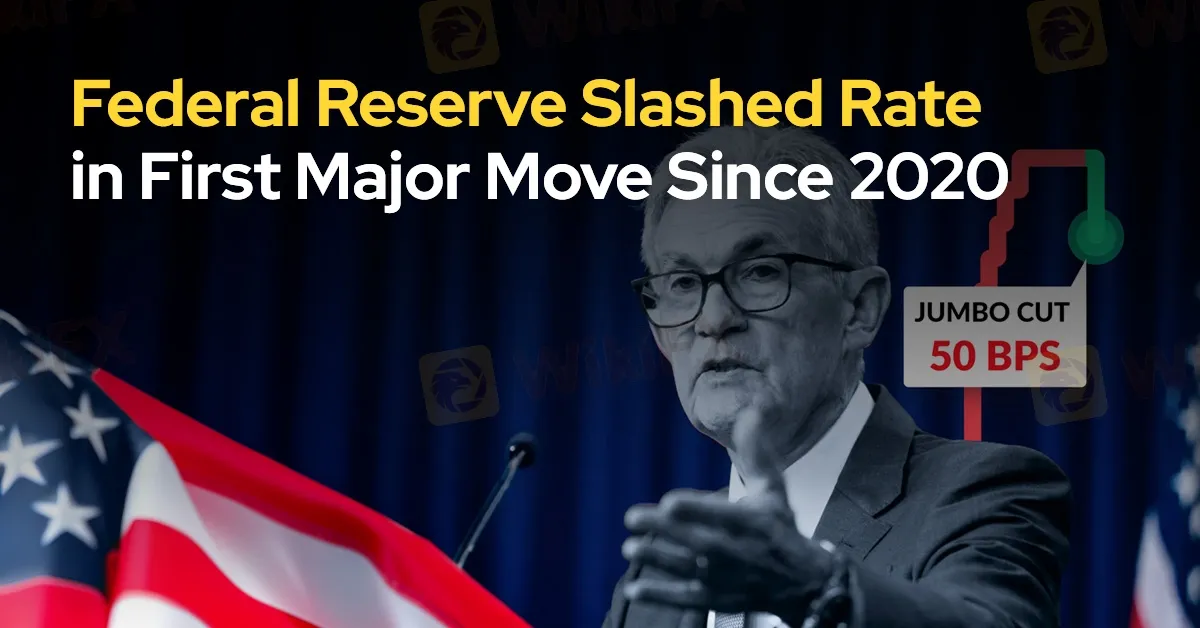简体中文
繁體中文
English
Pусский
日本語
ภาษาไทย
Tiếng Việt
Bahasa Indonesia
Español
हिन्दी
Filippiiniläinen
Français
Deutsch
Português
Türkçe
한국어
العربية
Federal Reserve Slashed Rate in First Major Move Since 2020
Abstract:The U.S. Federal Reserve has made its first interest rate cut in over four years, lowering the benchmark rate by half a percentage point. This significant reduction, which exceeds the typical quarter-point adjustments, signals growing concerns within the central bank about its ability to maintain control over inflation.

The U.S. Federal Reserve has made its first interest rate cut in over four years, lowering the benchmark rate by half a percentage point. This significant reduction, which exceeds the typical quarter-point adjustments, signals growing concerns within the central bank about its ability to maintain control over inflation. The Federal Open Market Committee (FOMC) has been focused on ensuring that inflation remains manageable while promoting maximum employment.
According to the Federal Reserve, the committee is working to achieve its long-term goals of 2% inflation and full employment. The FOMC indicated increased confidence that inflation is trending sustainably toward the 2% target, though it acknowledged that balancing these objectives continues to pose risks. The rate cut brings the federal funds rate to a range of 4.75% to 5%, signalling the beginning of the first easing cycle since the pandemic began in 2020.
The decision to cut rates comes after a period of more than two years of aggressive rate hikes aimed at combating inflation. Inflation had surged to 7% in 2022, but by July 2024, it had moderated to 2.5%. The Federal Reserve‘s recent statements reflect optimism regarding inflation’s trajectory, though the issue has not been fully resolved. Despite the reduction, inflation remains a pressing concern, according to a report by the Financial Times.

While the Federal Reserve has expressed confidence in the progress made toward achieving its inflation target, the decision to implement a half-point cut was not without controversy. Michelle Bowman, a member of the FOMC, reportedly opposed the decision, favouring a smaller, quarter-point reduction. Bowman's dissent marked a notable departure, as it was the first time a Fed governor had opposed a rate decision since 2005, according to CNN.
Economic analysts believe that the Federal Reserves decision could have wide-reaching effects on both the U.S. and global economies. Over the past few years, inflation was driven to a 40-year high due to pandemic-related disruptions and subsequent policy measures. With inflation now showing signs of moderation, the large rate cut may influence international markets. According to Reuters, the move is expected to impact currency valuations and global economic conditions, as such decisions often reverberate through the financial system.
The timing of the rate cut, coinciding with the buildup to the U.S. presidential election, adds another dimension to the economic landscape. The Federal Reserves actions may become a focal point in discussions around economic management, potentially influencing public perceptions of both inflation and cost-of-living issues. The scale of this reduction could also become a point of debate as political stakeholders weigh in on the broader implications for the U.S. economy.

Disclaimer:
The views in this article only represent the author's personal views, and do not constitute investment advice on this platform. This platform does not guarantee the accuracy, completeness and timeliness of the information in the article, and will not be liable for any loss caused by the use of or reliance on the information in the article.
Read more

The Daily Habits of a Profitable Trader
Every professional trader follows a structured approach to ensure they are well-prepared, disciplined, and able to seize opportunities with confidence. Whether you are a seasoned investor or an aspiring trader, adhering to a robust daily checklist can significantly enhance your performance. Use this checklist to check if you are a qualified trader

Authorities Alert: MAS Impersonation Scam Hits Singapore
MAS scam alert: Scammers impersonate officials, causing $614K losses in Singapore since March 2025. Learn how to spot and avoid this impersonation scam.

Billboard Warns of Crypto Scams Using Its Name – Stay Alert!
Billboard warns against fake crypto scams using its brand. Learn how to spot fraud and protect yourself from fake promotions.

The Impact of Interest Rate Decisions on the Forex Market
Interest rate changes determine currency attractiveness, influencing capital flows and exchange rate trends. Understanding this mechanism helps investors navigate the forex market effectively.
WikiFX Broker
Latest News
The Withdrawal Trap: How Scam Brokers Lure Victims into Paying More
FCA to Investors: Think Twice Before Trusting These Brokers
Trump\s tariffs: How could they affect the UK and your money
Trump gambles it all on global tariffs he\s wanted for decades
TradingView Brings Live Market Charts to Telegram Users with New Mini App
Trump tariffs: How will India navigate a world on the brink of a trade war?
Interactive Brokers Launches Forecast Contracts in Canada for Market Predictions
Authorities Alert: MAS Impersonation Scam Hits Singapore
IG Group Acquires Freetrade for £160M to Expand UK Investment Market
U.S. March ISM Manufacturing PMI Released
Currency Calculator








